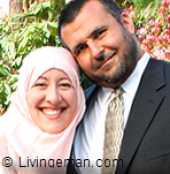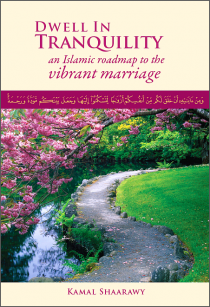Dwell in Tranquility: An Islamic Roadmap to the Vibrant Marriage
Buy the book | Explore the book | Testimonials
- Are you ready for marriage? What are your marriage goals?
- What are compatibility factors you should consider when selecting a spouse?
- What are the red flags that you should look out for?
- What are your marital responsibilities and rights?
- What do love and intimacy look like from the Islamic paradigm?
- What are the essential skills for a vibrant Islamic marriage?
- How do you effectively manage and resolve conflicts with your spouse?
Single? Improve your self-awareness and learn how to build life goals and realistic expectations in order to prepare for marriage.
Engaged? Get to know your Islamic rights and responsibilities, how to recognize true compatibility, and how to avoid common pitfalls.
Married? Gain a practical and deeper understanding of the successful model of Islamic marriage, learn essential skills that bring more bliss to your home.
Explore the Book
- Part 1: Preparing for Marriage
- Part 2: Barriers to a Successful Union
- Part 3: Pathways to a Vibrant Marriage
Chapter 1: Why is Marriage Important?
Explores the importance of marriage and why pre-marital preparation is crucial. Also discussed are the significance of marriage in Islam and the exploration of issues and questions that stimulate the reader to ask himself or herself what marriage means to them, how high on the priority list of their life goals marriage falls, and what their genuine, honest perception and expectation of marriage is.
Chapter 2: Self-Understanding is Crucial to Success in Marriage
Explores why self-knowledge and self-understanding are fundamental to a successful marriage. The reader comes away with the realization that you can’t successfully select your partner for life without knowing yourself first—including strengths, weaknesses, and goals in life. With self-awareness and self-examining, the reader gains clarity about what he or she is looking for in a spouse. Allah SWT invites us to see what is in our own selves, “As also in your own selves, do you not then see?” (Qur’an, Adh-Dhariat, 51:21). Two essential aspects of self-knowledge are explored: Self-awareness — knowledge of the dynamics of the soul; and self-examining — the daily practice of holding ourselves accountable and sincerely assessing what areas can be improved.
Chapter 3: Marriage, Love, and Intimacy
Presents common myths about love so that the reader first understands what does not constitute true love, such as mere sexual attraction or trying to control your spouse’s life. This chapter then looks at the Islamic teachings about love and shines the light on the counter-productive, or at times even dangerous, idea of unconditional love. The reader is guided into an exploration of their own personal definition of love and led to an expanded understanding of the many aspects of marital love including truthfulness, forgiveness, longing, kindness, fascination, shared responsibility, flexibility, common goals, respect, and shared fun. Finally the text delves into the issue of whether loving is an art that can be learned as spouses strive to achieve the deepest of intimacy. This intimacy is presented as a gradual process of weaving together an exquisite garment stitched with threads that include pure intentions, respect of each other, and deep abiding affection.
Chapter 4: The Islamic Rights & Responsibilities of Spouses
Looks at the all important issue of spouses knowing their Islamic rights and responsibilities. These rights and responsibilities encompass all realms of being: the social, emotional, psychological, spiritual, physical, material, and financial realms. And this knowledge base is presented within a framework of spouses as allies, with each spouse looking to ensure that he or she carry out all of their own responsibilities; and at the same time being just as dedicated to ensuring that the spouse be given all his or her rights. This is the opposite of the environment in which each is scrambling to defend and deny his/her own weaknesses and shortcomings while quick to point out the shortcomings of the other. Rights and responsibilities emerging from a model of spouses as allies is shown to be the foundation for a successful union of souls.
Chapter 5: An Islamic Roadmap to the Selection Process
Helps the reader be clear about why they are seeking to get married and to increase their awareness of the Islamic guidelines for selecting a potential spouse. The reader comes away with keen understanding that in addition to the two most important criteria—deen and good manners—it is essential to seek a spouse with whom they are compatible. This compatibility includes of course educational level, similar Islamic aspirations, and other similarities of background. However, this chapter presents a compelling case that compatibility also encompasses, and perhaps most importantly, the emotional resonance of the couple—a mutual understanding or trust between the man and woman who are considering marriage so that there is a mutual surrendering of hearts. More practical aspects of the selection process are then presented such as secure ways to meet a potential spouse and what to do after meeting that individual in terms of questions to ask, verifying information, getting references, and determining whether both are truly ready for marriage. Finally, the chapter gives a brief overview of the marriage contract, its five main requirements, and the right for the couple to include additional agreed-upon stipulations in the contract.
Chapter 6: Pinpoint the Negative Influence of the Past
The goal of this chapter is to facilitate the reader’s awareness of the powerful influence of the past so that he/she can enhance their positive traits as well as make a lifelong commitment to acknowledge and eventually eliminate their negative traits. This chapter explores how one’s family of origin impacts self-understanding, and how we can discover any unmet needs and ways to fulfill those needs. It provides guidelines for breaking the cycle of negative feelings, attitudes, and/or behaviors that can damage one’s life as well as a marriage relationship, and explores deeply the compulsion to control and how to overcome it.
Chapter 7: Identify Negative Habits
In this chapter, an in-depth look at common character/psychological issues—anger, resentment, depression, guilt, and others—allows the reader to come away affirmed in their belief that human beings have an inherent capacity to grow, and that we can choose to foster that growth rather than to leave the soul to stagnate or diminish. Guideposts in the Qur’an and sunnah about how to change are presented as well as contemporary research and insight on the process of change and its stages.
Chapter 8: The Unhealthy Marriage Model
This chapter investigates the contours of an unhealthy relationship and shines a spotlight on a model that includes the toxic components of heedlessness and ignorance, negative self-image or a low self-confidence, and/or abuse. Each of these components is discussed in detail and their unhealthy effects are outlined so that the reader will have the tools to detect any warning signs in themselves or the marital relationship. This chapter also explores more deeply the issue of abuse, showing that the most toxic relationships are those that involve abuse in any of its forms. It defines the basic parameters of physical abuse, emotional or verbal abuse, sexual abuse, financial abuse, and abuse through control and isolation.
Chapter 9: The Islamic Model of Marriage
Explores the image of marriage as portrayed in the Qur’an and sunnah, which is based on the foundations of taqwa (virtuousness or consciousness of Allah); mawaddah (abundant love); and rahmah (mercy). However, each of these foundations is developed with details and examples so that the reader is not left with just a theoretical understanding. For example, mawaddah is given specifics such as becoming fluent in three essential love languages: “tell me,” “show me,” and “touch me.” Also delineated are the far-reaching benefits of the Islamic model of marriage and the essential place of adab (good manners, morals, and decency) in a healthy marriage relationship.
Chapter 10: Foundational Skills for a Healthy & Blissful Marriage
This chapter introduces the idea from hadeeth that guarding and protecting our relationships has a higher degree of reward than prayer (salah), fasting (sawm) and charity (sadaqah). It is made clear that the hadeeth does not lessen the significance of these pillars of Islam in any way, but rather points to how essential relationships are. The fact that a defect in the relationship wipes out one’s religion (deen), according to the hadeeth, indicates the tremendous impact our relationships have on us. If we consider how draining of energy a miserable marriage relationship is, we can understand how depression, hopelessness, resentment, and other negative experiences that result from a dysfunctional and unhappy marriage, can gradually erode one’s practice of Islam. After highlighting this enormous centrality of healthy relationships, the text looks at communication skills, patience and gratitude, listening, skills, and the practice of silence and reflection as modalities that contribute to the health and happiness of the marriage relationship.
Chapter 11: Essential Skills for a Vibrant and Successful Marriage
Highlights some of the most essential tools for making marriage work. This includes enjoining the right and forbidding the wrong and why the guiding principles of this virtuous trait are essential skills for married couples. It is shown that only through the sincere advice to each other that the couple can grow and live a wholesome life. Also discussed are assertiveness skills which ensure that each spouse can communicate their feelings and needs clearly, effectively, and respectfully. Assertiveness is shown to be the crucial ability to stand up for one’s rights without hurting other people’s rights. Practicing consultation in decision-making (shura), and conflict resolution skills are presented as wonderful tools that keep the marriage strong, resilient, and growth-oriented. Also covered are the practical steps necessary to acquire new habits and maximize success.
Chapter 12: Marriage Q&A
The final chapter presents a number of questions such as How can we cultivate and maintain a peaceful relationship with our in-laws? Or I believe in the religious obligation of hijab. She promises to wear hijab after we get married. Will our relationship succeed? The questions are relevant, applicable to daily life and the marriage relationship, and answered in a thorough and incisive way.
Testimonials
T.K., California
I thank Br. Kamal for all his help and for showing me what I can accomplish. He has shown me the path to happiness and success. He was patient with me and never gave upon me despite all my problems. Depression is no longer destroying my marriage. I can’t thank him enough.”
L.G., Pennsylvania
I want to express the utmost appreciation for all the time and effort Kamal has devoted above and beyond being a behavioral specialist working with each and every member of our family. He will truly be missed by all of us. He has made quite a positive impact on us all.”
Anna, Oakland, CA
I have worked with counselors before, but no one has had such a noticeable positive impact on my life like Kamal Shaarawy. This is not typical talk-therapy. Rather, he gives you concrete, practical exercises that reshape old ways of thinking and behaving into constructive and uplifting lifelong habits. Within a few short months, I had a restored sense of self-confidence, better insight into how to choose the right life partner, and an openness and excitement about pursuing this next part of my life.”
L.B, San Carlos, CA
Brother Kamal is a great counselor. He listens and participates in making people aware of the issues and solutions. I enjoy listening to him and admire the way he analyzes my problems.”
H.M., West Virginia
Wonderful book! What makes Br. Kamal Shaarawy’s work Dwell in Tranquility stand out is that it sets the stage for guided introspection and discussion to answer the important questions regarding marriage: Am I ready for marriage? What does a healthy marriage and unhealthy marriage look like and how are they created? What can I do to make it a healthy one? Are my potential partner and I compatible for marriage and what steps can I take to find that out? What gaps can we address in our marriage and how can we actively take steps to bridge them? What are the common misconceptions about marriage?
What makes his book particularly instructive is that he integrates Islamic concepts into the text, so that our aim is on the akhirah, and at the same time we gain in this world as well, insha’Allah. This publication is peppered with Qur’anic verses, hadiths, along with individual and partner-oriented questions and action-based exercises to guide us on our journey. The periodic case studies mentally prepare you for the type of scenarios that can pop up in a marriage, all the more providing compelling evidence for why we need to actively prepare for marriage, and delivers hope and confidence that conflicts can be resolved with the proper tools and guidance.
It has personally been very beneficial to me and I reference it time and time again. I’ve also passed along a copy to a sister who is looking to work on improving her marriage. I’m currently reading it another time because I’m excited to bring my best to my marriage when it happens, insha’Allah and I have confidence that Br. Kamal’s book can facilitate its success! Thank you, Br. Kamal! JazakAllah khair!”






